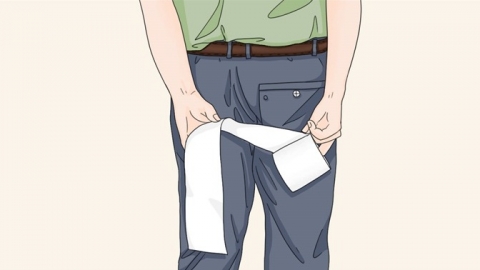What causes anal pain and how to deal with it
Generally speaking, the term "butt" refers to the anus. Anal pain may be caused by dietary irritation, constipation, anal fissures, hemorrhoids, perianal abscess, and other factors. Treatment options include general therapy and medication, under the guidance of a physician. If discomfort occurs, it is recommended to seek medical attention promptly. A detailed explanation is as follows:

1. Dietary Irritation
Consuming large amounts of spicy foods, such as chili peppers and Sichuan peppercorns, can irritate the mucous membranes and nerve endings around the anus when passing through, causing local vasodilation and tissue congestion, which leads to anal pain. It is important to adjust your diet reasonably, reduce the intake of spicy foods, and increase consumption of vegetables and fruits.
2. Constipation
Dry weather or insufficient water intake can lead to constipation. When constipated, dry and hard stools require increased abdominal pressure to be expelled, exerting significant pressure and friction on the anus, which can easily cause damage or tearing of the anal mucosa and subsequent pain. It is important to develop good bowel habits, defecating at regular times daily and avoiding holding in stool.
3. Anal Fissures
Anal fissures are often caused by long-term constipation and hard stools. During defecation, the anal skin can tear due to the passage of hard feces, resulting in ulcers. Due to the high concentration of nerves in the anal area, anal fissures often cause severe pain, which may be accompanied by rectal bleeding and other symptoms. Under a doctor's advice, medications such as Maziren Runchang Pills, Sophora japonica Pills, and Compound Aloe Capsules can be used for treatment.
4. Hemorrhoids
Hemorrhoids may result from prolonged sitting or standing, chronic constipation, pregnancy, and other factors. When hemorrhoids develop thrombosis, become incarcerated, or inflamed, they can cause anal pain. Symptoms may also include prolapse of anal masses and anal itching. Under medical guidance, medications such as Ma Yinglong Musk Hemorrhoid Ointment, Compound Carrageenan Suppository, and Hemorrhoid Suppositories can be used for treatment.
5. Perianal Abscess
A perianal abscess may be caused by anal gland infection with subsequent inflammation spread. The infection in the perianal tissue increases local pressure and stimulates surrounding nerve endings, causing severe pain. Symptoms may also include fever, chills, and fatigue. Patients should follow medical advice and use medications such as Penicillin V Potassium Tablets, Cefaclor Capsules, and Ofloxacin Capsules for treatment.
In daily life, it is important to avoid prolonged sitting or standing and to get up and move around regularly. Additionally, reducing mental stress is important, as long-term tension can affect gastrointestinal function, potentially leading to issues like constipation. Stress can be alleviated through appropriate exercise, listening to music, and other relaxation methods.




